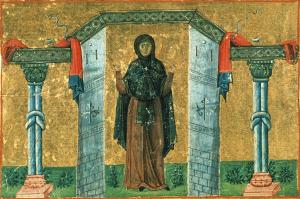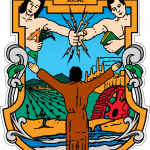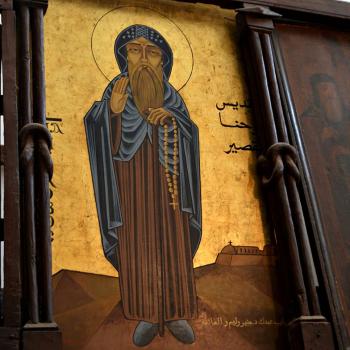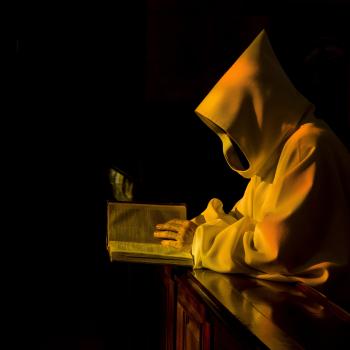
Source: Anonymous: /WikimediaCommons
Teaching, especially teaching in a leadership position, guiding others so they learn not only what to think but how to think and act, is a very important activity. Communities need teachers not only to pass down their values, but to reform them when needed. Not all beliefs, not all ideas, should be passed down.
We are all called, in a way, to be teachers, because we all have something to share with others. Nonetheless, we are not all the same, with the same knowledge and wisdom, nor with the same ability to teach others: we can all teach, but only those who are worthy, through hard work and labor, should take the role of being a teacher. Those who are not ready, those who are not qualified, and try to take on the role of teacher for personal gain will be blameworthy for their failings. This is especially true to those who try to claim the authority of being a teacher in a religious setting. St. James warned that those who want to take on the role of being a religious authority who teachers others will take on a great risk upon themselves because they will justly be criticized, if not outright condemned, for the harm they cause by their mistakes:
Let not many of you become teachers, my brethren, for you know that we who teach shall be judged with greater strictness. For we all make many mistakes, and if any one makes no mistakes in what he says he is a perfect man, able to bridle the whole body also (James 3:1-2 RSV).
We must not read James as if he were stating that no one should be a teacher in the basic, elementary sense, but only that few people should take on the mantle of someone in authority, teaching others based upon such authority. Those who proclaim their own authority will be held to blame not only for their own mistakes, but the mistakes of their disciples as well. To be someone in authority requires not only much study, but also, much self-discipline; those who want to be religious authorities must demonstrate their own teachings through their own lives. “A man may be shrewd and the teacher of many, and yet be unprofitable to himself. A man skilled in words may be hated; he will be destitute of all food, for grace was not given him by the Lord, since he is lacking in all wisdom” (Sirach 37:19-21 RSV).
The Desert Mother, Theodora, gave a good rendition of what to expect from a good spiritual teacher:
The same amma said that a teacher ought to be a stranger to the desire for domination, vain-glory, and pride; one should not be able to fool him with flattery, nor blind him by gifts, nor conquer him by the stomach, nor dominate him by anger; but he should be patient, gentle and humble as far as possible; he must be tested and without partisanship, full of concern, and a lover of souls.[1]
What Theodora considered as necessary for someone to be a spiritual authority can be seen to be much, but that is because they take on a great responsibility when they take on a position of authority. She wanted teachers to not only have solid teaching, but lives which demonstrate the quality and character of their noble sentiments. This is not to say that sinners cannot teach, that is, the truth of what someone teaches is not dependent upon the quality of the person who teaches, but those who want to take authority, to act as a spiritual authority capable of directing others, should demonstrate the way their teachings can be implemented in actuality and not just in theory. It is easy to say what must be done but that should not be the end of pedagogy, only its beginning. We need to know more than the goal, but the means to get there; those who have not learned how to get there in their own lives will not be able properly direct and guide others in theirs.
In this manner, then, Theodora, Amma Theodora, having long followed the wisdom handed down to her and engaged it and lived it through her own self-discipline, was able to offer insight into teaching, recognizing what makes for good and bad teachers. She was able to pass down this insight, and teach us, so that we do not have to follow the mistakes of the past and fall for bad teachers when the signs for such teachers are before us. What she believed to be key to see who were bad teachers was the way they do not focus on themselves and their own spiritual reform but in the way they can manipulate others. To them teaching is not about wisdom but power. Bad teachers like to feel as if they are in control, but they also like to feel as if their teaching and ideas are desired by their disciples: they will act and react according to the way their students act towards them, so that they can slowly gain more control and dominance over their students while having their students treat them with utmost respect and honor. They feel they are good teachers if their pupil flatter them, and so at the same time they think they have power, they also loose it as their pupils know how to manipulate and control them in return (this, of course, is true not only in regards spiritual authorities, but people in any role of authority, such as politicians: the more they feel they are in control while they are being flattered or bought off by their constituents, the more they prove themselves unfit for authority and are likely to be leading themselves, and those under their authority, astray).
Likewise, then, a proper spiritual authority should be one who cares for and loves others, indeed, they should be dead to the self so that they look not for their own gain but for the gain of others. They should have acquired wisdom and lived out its dictates. Patience, kindness, humility, charity, justice, should all be a part of their life. They must do more than merely speak of them. They should love others; if they are to be in a position of authority, it should be to them as if nothing: the authority should not matter to them, the fame and glory associated with it should be as if naught. They should be pleased if they are able to do good, helping one person in secret: this, of course, is why so many of us are not yet ready to take on such a position and mantle for ourselves. As we discern that we have yet to overcome inordinate passions in our own lives, how can we be seen as authorities capable of directing others away from them? This does not mean we cannot teach, that we cannot speak out, but we must do so in a humble fashion, recognizing our limitations, indeed, making sure people do not think more of us and our wisdom and knowledge than what it is. We can share with each other our daily struggles and the potential insights we have gained, but in doing so, we should do so with the recognition that we do not do so as authorities, as “teachers” with great insight, but as fellow travelers along the way, fellow travelers in the pilgrimage of life who have yet to get to a station ahead of others that would give us the vantage point we need to direct them towards our common goal.
“An educated man knows many things, and one with much experience will speak with understanding” (Sirach 34:9 RSV). Education needs experience to verify what has been studied, so that the person can become a wise teacher. But wisdom can be had without education. It is better to be wise, to intuitively know what is good and true through experience, than to seek out the truth in study and yet never to act upon it and therefore to truly come to know it. Some will appear wise, due to their education, and yet will be fools because they live in a world of theory without realizing the truth for themselves. The famous desert monks and nuns of yesteryear were capable teachers because of this: they knew the truth from experience. Some of them, many of them, were educated, giving them an intellectual foundation for their actions, but many were not. They did not have to be. To be a teacher, to have spiritual authority, requires such wisdom first, and the scholarly knowledge second. Without such wisdom, and the experience behind it, we should not classify ourselves as being an authority but as fellow travelers trying to figure out the path together. We can know many things through study, but we are not yet authorities because we have yet to act upon the truth and let it completely transform us in the process.
[1] The Sayings of the Desert Fathers. Trans. Benedicta Ward (Kalamazoo, MI: Cistercian Publications, 1984), 83-4 [Theodora 5].
Stay in touch! Like A Little Bit of Nothing on Facebook













